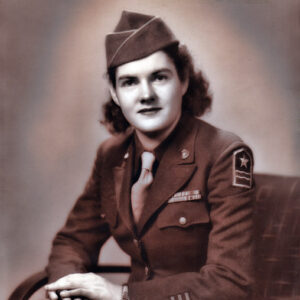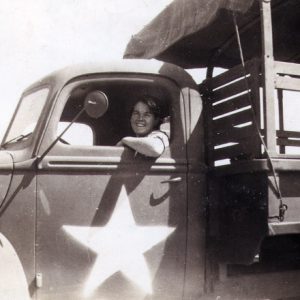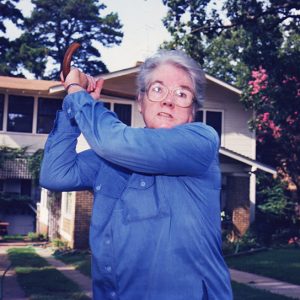calsfoundation@cals.org
Lucille (Lucy) Babcock (1921–1993)
Lucille (Lucy) Babcock was a noted actress in theater and television who established the first community theater in Little Rock (Pulaski County). She also fostered the literary organizations her grandmother, writer Bernie Babcock, founded.
Lucy Babcock was born Lucille Thornburg on September 30, 1921, to Frances Babcock Thornburg and John Thornburg. She had one sibling. While she was still an infant, her father deserted the family. Her grandmother had purchased Broadview, a wooded acreage that overlooked Little Rock, and the family moved into her barn-cum-house.
At school, she was often in trouble for defending the underdog, recalling, “No one ever told me fighting was wrong.” Her circumstances and the area where she lived branded her as “white trash.” She attended Forest Park Elementary, but, by the tenth grade, she had stopped attending Pulaski Heights Junior High. Due to a shortage of manpower, on the eve of World War II, she began driving Greyhound buses between Little Rock and the Maumelle Ordnance Works, where munitions were manufactured. Once the war started, Bernie Babcock used her connections with Eleanor Roosevelt to get her granddaughter a job working as a filing clerk at the Pentagon. On the suggestion of Roosevelt, she joined the Women’s Army Corps (WAC).
She married a young policeman, Don Junkins, in December 1942, though the marriage lasted only until June 1943. After basic training, she became a classification specialist and signed herself up for overseas duty. In Naples’s harbor, her ship was hit by an Italian suicide bomber, with loss of more than 300 American lives. Because of her experience in driving buses, she was pressed into service as an ambulance driver. Her back was injured when a “Screaming Mimi” (a piece of German rocket artillery) overturned her ambulance; the pain plagued her throughout life. In Egypt at Camp Russell B. Huckstep, Middle East Service Command, she drove a supply truck through Cairo to Alexandria to pick up provisions until the war ended in 1945.
In the fall of 1946, she enrolled through the GI Bill at Arkansas State Teachers College (now the University of Central Arkansas) in Conway (Faulkner County), but she left after two years and became a student at the Pasadena Playhouse. She later auditioned with the American Theater Wing in New York City. She acted in radio serials, television soap operas, and dramas such as The Hallmark Hour. At this point in her career, she changed her name to Lucille Babcock.
In 1954, Babcock returned to Little Rock and worked as a humane officer for the sheriff’s department, investigating mistreatment of both animals and people. She was hired by KARK-TV to host Aunt Lucy’s Animal Fair, a Saturday morning show using animals borrowed from Frank Buck’s Florida menagerie. At the request of the Chamber of Commerce, she established the city’s first community theater. Performances were held in a converted seed store, county court room, medical center auditorium, and Robinson Auditorium. The actors gave eight performances each week, and plays were reviewed by New York drama critics. Babcock often cast African-American students from Philander Smith College in her plays. Opposition came from the Ku Klux Klan, the White Citizens’ Council, and Governor Orval Faubus, who told her to “get the niggers out of the theater.” While Babcock was in Oklahoma accepting an award for her contribution to integration, the Community Theater board voted to close the theater. After a cross was burned in her mother’s yard, she returned to Broadway.
She came back to Arkansas between Broadway engagements. She was active in community and small theaters across the state. However, her health deteriorated, and shortly after her grandmother’s death in 1962, she returned to Little Rock for good. She enrolled briefly in Little Rock University (now the University of Arkansas at Little Rock). In 1966, she directed the Greater Little Rock Community Theater.
Babcock became president in 1976 of the Poets’ Roundtable of Arkansas, and she worked to integrate the organization. In 1981, she convinced editors of the Arkansas Gazette that they should have a weekly poetry column.
On July 29, 1987, as she typed her column, she looked out her garage-apartment window and saw a man dragging a screaming young woman by the hair. Wearing a back brace and using a cane, she somehow reached the attacker and beat him. Her shouts alerted workmen who captured him. The next morning, the Gazette’s front page carried a color photo of Babcock brandishing her cane. The story was picked up by the wire service and spread across the country. She was subsequently honored by the Little Rock Rape Crisis Center, and Governor Bill Clinton presented her with a commendation for her bravery. She was declared an Arkansas Times hero, and features about her appeared in the New York Times, Reader’s Digest, Woman’s Day, Woman’s World, Guideposts, and Newsweek. The Smithsonian Institution requested and was promised her cane, but it was stolen from her grocery cart.
In May 1988, Winthrop Paul Rockefeller presented Babcock with the Carnegie Hero Award, a medal struck especially for her, along with an award of $2,500.
On April 4, 1993, Babcock died in her sleep. She is buried in Little Rock’s National Cemetery.
For additional information:
Babcock, Lucy. “Lucille Babcock Records Her Memories of Her Grandmother Bernie Babcock for Marci Camp.” 1985. Audio at Butler Center for Arkansas Studies, Bobby L. Roberts Library of Arkansas History & Art, Central Arkansas Library System: Lucy Babcock Recording (accessed February 22, 2022).
Camp, Marcia. StoryCorps Interview #MBY002176 with Lucy Babcock, 2007. American Folklife Center, Library of Congress, Washington DC.
Dean, Jerry. “Lucy Babcock, Hero.” Arkansas Gazette. March 3, 1990, pp. 1E, 5E.
Reed, Roy. “A Leg in a Brace and White Hair, but Still a Tiger.” New York Times. September 21, 1987, p. 10.
“Woman, 65, and Cane to Rescue.” New York Times. August 1, 1987. http://www.nytimes.com/1987/08/01/us/woman-65-and-cane-to-rescue.html (accessed February 22, 2022).
Marcia Camp
Little Rock, Arkansas
 Arts, Culture, and Entertainment
Arts, Culture, and Entertainment Lucille Babcock
Lucille Babcock  Lucille Babcock
Lucille Babcock  Lucy Babcock on Stage
Lucy Babcock on Stage  Lucy Babcock
Lucy Babcock 




Comments
No comments on this entry yet.